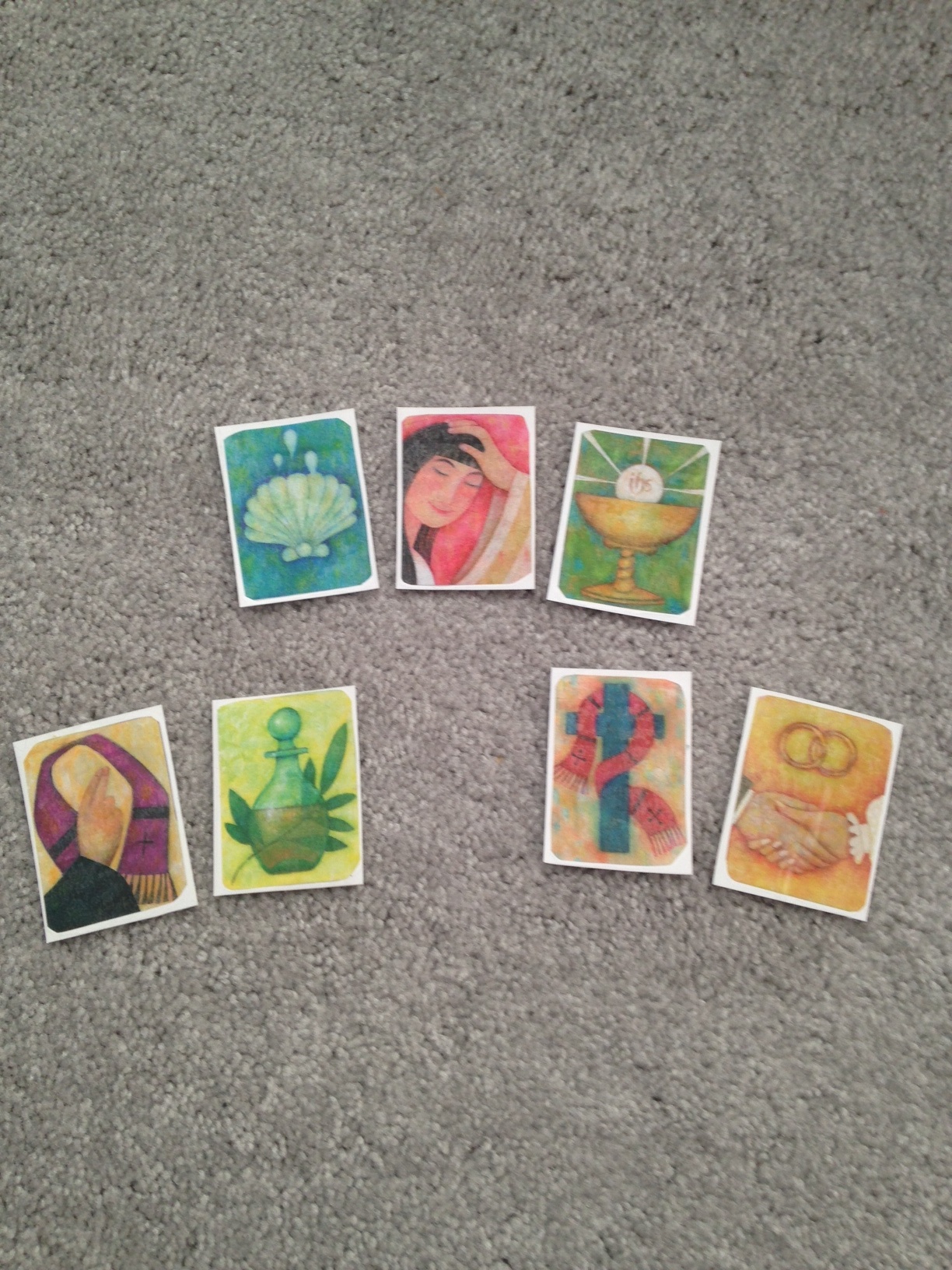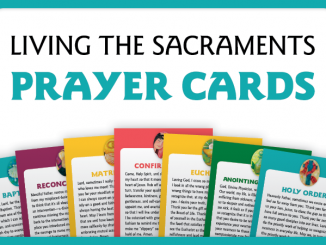My lesson for this evening picks up where we left off last week as we learned about God’s presence in Solomon’s Temple, in the Eucharist, and in ourselves. Tonight, we focus on how we recognize God’s presence in the Sacraments, respect God’s presence in others (this is part of our safe environment program) and reveal God’s presence to others through works of mercy.
Session 21: The 3 R’s
Big Idea: We are called to Recognize, Respect, and Reveal God’s presence
Preliminaries: (10 mins)
1. Opening procession and prayer ritual:
a. 3 fold sign of the cross
b. Have mercy on us O Lord…
c. thanks/intentions
Engage #1: Recognizing God’s Presence (5 mins)
1. Invite young people to play “Where’s Waldo?”
2. Say, “It would be a lot easier to find Waldo if we had some hints or signs pointing to where he is.”
3. Place an arrow pointing to where Waldo is. Say, “Signs are very important for helping us to recognize something important. Today, we’re going to learn about how signs help us to recognize the presence of Jesus in our lives.
Explore: (20 mins)
1. Write the following words on the board:
a. invisible
b. intangible
2. Ask volunteers to explain what these words mean. Invisible means unable to be seen. Intangible means unable to be felt or touched.
3. Explain that God’s presence is invisible and intangible: we cannot see God or touch him in physical form without some help. “The Church gives us 7 signs to recognize and encounter God’s presence…to make God’s presence visible and tangible. What do we call those 7 signs?” (Sacraments)
4. Write the word Sacraments on the board. As a class, strive to name all 7. (Baptism, Confirmation, Eucharist, Reconciliation, Anointing of the Sick, Matrimony, Holy Orders)
5. Read Finding God pgs 200-201
6. Distribute scissors and invite the students to cut out the images of the signs of the 7 sacraments on pgs 200-201
7. Have them glue the signs to index cards and then to tape with clear packing tape and then cut the cards so that they have “laminated” Sacraments cards. Have them mark each card on the back indicating if it is a Sacrament of Initiation, Healing, or Service of Communion.
clear packing tape and then cut the cards so that they have “laminated” Sacraments cards. Have them mark each card on the back indicating if it is a Sacrament of Initiation, Healing, or Service of Communion.
8. Tell the students to use these cards to study and memorize the names and categories of the 7 Sacraments for a quiz next week. Put the Sacraments away and collect materials.
Engage #2: Respecting God’s Presence (5 mins)
1. Invite volunteers to come forward and to draw quick sketches on the board of the following: baseball diamond, football field, tennis court.
2. Point out that all 3 have something in common: boundaries! Baseball has foul lines, football has sidelines, and tennis has baselines and sidelines.
3. Explain that we show respect for God’s presence by observing boundaries.
Explore: (20 mins)
1. Distribute pictures of the Jerusalem Temple which was considered the focal point of God’s presence.
2. Place large image on the board and invite volunteers to come forward and indicate the boundaries separating the Gentiles, Jewish women, Jewish men, the priests, and the Ark of the Covenant (God’s presence)
3. Remind the students that St. Paul taught that WE are Temples of the Holy Spirit! This means that we must respect one another and we do so by observing boundaries. Point out that we need to be on guard against people who do not respect such boundaries and try to take advantage of us and we ourselves need to learn and respect these boundaries.
a. Physical – examples of physical touch that disrespects boundaries: excessive/prolonged hugging, massaging shoulders, excessive closeness, unwanted touching, sit on lap, kiss, tickling, wrestling, piggyback rides, being alone (OK = pat on back or shoulder, handshake, side hug, high five, fist bump)
b. Emotional – examples of inappropriate emotional behavior: excessive compliments about physical appearance, intense emotional sharing, inappropriate pet names, personal self-disclosure, single out same child for special duties or responsibilities
c. Behavioral – invitation to smoke, drink, take drugs, watch inappropriate videos or video games, use vulgar language, exchanging texts, emails or FB, Twitter, or other social media, go places unsupervised, offer a ride, invite to home, offer private tutoring or coaching, sexual humor, pose for pictures.
4. Emphasize that most adults are respectful but that it is important to be aware of the possibility that someone is not. Emphasize the importance of telling a trusted adult if you have been the victim of such behavior.
Reflect: Revealing God’s Presence (15 mins)
1. Explain that we can help others to truly recognize God’s presence in this world by showing them mercy which is another word for kindness, fairness, compassion…treating someone like they are one of the family.
2. Invite young people to their sacred space and lead the following Guided Reflection on Corporal Works of Mercy.
Respond (5 mins)
1. Distribute Homework Notification Sheet inviting the young people to study their Sacraments Cards and to memorize the 7 Sacraments as well as informing parents of our Mercy Experience on Monday, April 21 at 6:30 pm.
2. Closing prayer




Leave a Reply